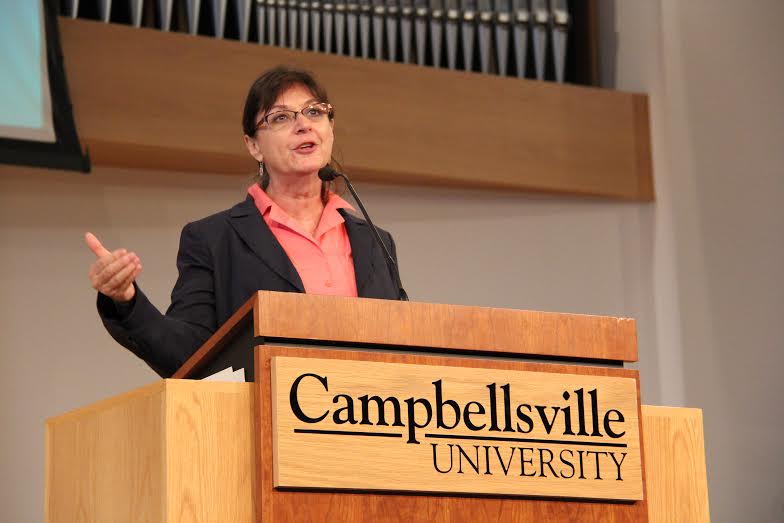By Bob Allen
A leading advocate of the view that the Bible calls women and men to share authority equally in service and leadership in the home and church recently urged students at Campbellsville University to push past assumptions about the Apostle Paul.
 “We might think, for example, that the Apostle Paul does not believe in the leadership of women,” Mimi Haddad, president of Christians for Biblical Equality, said in chapel Sept. 2 at the private Christian university in Campbellsville, Ky., until recently affiliated with the Kentucky Baptist Convention.
“We might think, for example, that the Apostle Paul does not believe in the leadership of women,” Mimi Haddad, president of Christians for Biblical Equality, said in chapel Sept. 2 at the private Christian university in Campbellsville, Ky., until recently affiliated with the Kentucky Baptist Convention.
Haddad, a graduate of Gordon Conwell Theological Seminary with a Ph.D. in historical theology from the University of Durham in England, said a superficial reading of Paul in 1 Timothy 2:11-15 might cause some to “believe his effort to guide some misguided women in Ephesus to serve as an identity marker of his views on gender.”
In reality, she said, the apostle “was one of the great advocates of women in all of antiquity.”
“To misapply a few verses from Paul while overlooking the bulk of his work is to make shallow assumptions of Paul,” Haddad said. “We need to push past an incomplete reading of Paul in order to grasp the full significance of his life and work.”
Haddad said apart from Jesus’ empty tomb, Paul’s conversion “is really one of the most outstanding facts in all of history.”
“His inner transformation in Christ so altered his worldview it compelled him to promote one of the most redemptive and radical social policies of his day,” she said. “Paul’s encounter with the cross of Christ was so dramatic that he abandons and then opposes the ethnic and gender segregation of the Jewish priesthood, promoting in its place the priesthood of all believers. Paul actually develops a social structure that undermines centuries of slavery and the subjugation of women.”
Haddad said God’s redemptive power in Paul challenges “the vitriolic patriarchy and male hegemony of the ancient world.” That is observed not only in his writings and ministry, she said, “but especially in his relationship beside the women he served.”
After his encounter with Christ on the road to Damascus and seclusion in Arabia, she said, Paul goes on to become not only one the church’s greatest theologians but “one of the founding proponents of women’s leadership and liberation.”
“Ultimately he builds a church beside women he celebrates as co-workers, as apostles, prophets, teachers, house church leaders and deacons,” she said.
Haddad said Paul embraced women “as equal partners in the gospel” and in every way his leadership “resembles that of Christ.”
“Christ engaged women theologically, expecting them to respond not as a distinct class but as people and disciples, as heirs of God’s kingdom,” she said. “Jesus continually broke social and religious taboos related to gender, and he consistently challenged the patriarchy of his day.”
“The rabbis of his day did not engage women theologically, and this is precisely what Jesus does,” she observed.
Haddad described Pentecost as “a giant inclusion party” fulfilling Joel’s prophecy that God’s Spirit would be poured out both on men and women. It is not insignificant, she added, that in Christianity baptism becomes the rite of initiation, replacing circumcision, which belonged only to men.
“Baptism was open to everyone, especially to women who were excluded from the covenantal sign of circumcision,” she said.
Haddad said the key to understanding Paul’s declaration in 1 Timothy 2:12 — “I do not permit a woman to teach or to assume authority over a man” — lies in correct translation of the Greek word authenteo, which typically describes autocratic or usurped authority and can even be translated “to kill.”
Haddad said she believes Paul’s intent was to address a particular type of domineering authority that would have been familiar to women converting to Christianity from the pagan worship of Artemis, the widely venerated Greek goddess of nature equivalent in the Roman world to Diana.
Formed in 1987, Christians for Biblical Equality a nonprofit organization of Christian men and women who believe that the Bible, properly interpreted, teaches the fundamental equality of men and women based on the teachings of Scriptures such as Paul’s writing in Galatians 3:28: “There is neither Jew nor Gentile, neither slave nor free, nor is there male and female, for you are all one in Christ Jesus.”
Theologians call the group’s position “egalitarianism,” meaning that the Bible calls women and men to share authority equally in service and leadership in the home, church and world.
A competing view, called “complementarism,” declares that while created equally in God’s image, men and women have different but complementary roles of leadership and support in marriage, family life and religion.
Complementarian influence gave impetus to revisions of the Baptist Faith and Message in 1998 and 2000 declaring the wife “is to submit herself graciously” to her husband’s leadership at home and that “while both men and women are gifted for service in the church, the office of pastor is limited to men as qualified by Scripture.”
Founded in 1906 as a Baptist school, Campbellsville University ended its covenant agreement with the Kentucky Baptist Convention in 2014 over concerns about “undue influence and the imposition of theological and doctrinal control.”
